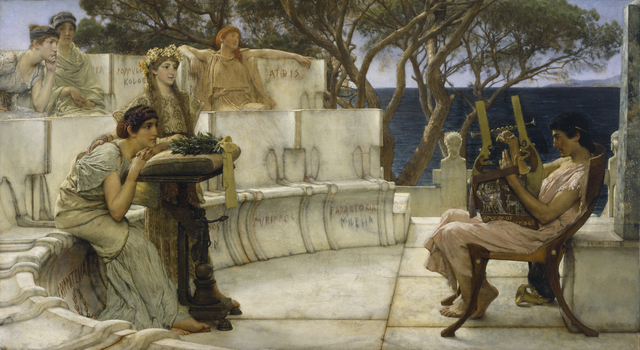Winter’s Latin Grammar by Philip Winter
 |
| Sir Lawrence Alma-Tadema: thanks to the Walters Art Museum, Baltimore |
Author: Philip Winter
Publisher: Johns and Fairfield
Source book: Love Among the Ruins by Angela Thirkell (Barsetshire #17)
When Philip Winter and his wife Leslie set up a prep school for sons of naval officers (officers, naturally, because it would be unlikely for naval ratings or petty officers to be able to afford such a school) he decides to write a more up to date Latin Grammar for his pupils.
Up until now everyone in Barsetshire has learned their Latin from Lorimer’s Grammar (see Summer Half). Lorimer taught classics for years at Southbridge School and died in 1937.
Philip also has some success with his little book about Horace, which is given no title, but always referred to as his ‘little book on Horace’… (Oxbridge University Press £1/3/8*). Mind you, we aren’t given a title for the Latin Grammar either so I created my own. All the books I learned Latin and Greek from were called Kennedy’s Latin Primer, North and Hillard, and Hillard and Botting. And they all felt as though they’d been written about 100 years ago. We probably could have done with Winter’s Latin Grammar. We had the Cambridge Latin Course which was fun, but failed to teach us any of the grammar necessary to read Latin written by actual Romans. And what Wikipedia has to say about it bears very little resemblance to the text I was taught from in the 1970s. Hic est Caecilius, Caecilius est pater, it began, before introducing us to Metella, Quintus, Clemens (I think), Grumio and Cerberus the dog.
Since everyone in Barsetshire has had a classical education except the comedy yokels (obvs), all the characters settle down to read a nice book about Quintus Horatius Flaccus (8 December 65 BC - 27 November 8 BC). I wouldn’t be surprised if some of the grander butlers didn’t sit down with a late night glass of brandy and a little book on Horace.
Horace is of course famous for his Odes and Epistles, and may be considered the world’s first autobiographer. I don’t think we read any Horace at my school but we certainly battled with a lot of Livy, Tacitus and Juvenal.
* 1 pound 3 shillings and eight pence which translates into decimal currency (as we used to say) as… er… £1.17 ish. Which once upon a was quite a lot of money.
 |
| Sir Lawrence Alma-Tadema: thanks to Wikipedia |
Comments